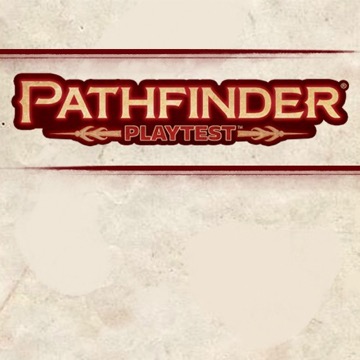As the Pathfinder Playtest begins, Game Masters will need to quickly get up to speed with the new rules. The Game Mastering chapter of the Pathfinder Playtest Rulebook is here to help you out! It covers the responsibilities of a GM, gives advice on running sessions, and teaches you how to adjudicate the rules of the game. Because this is a playtest, there aren't details about creating your own campaign or adventures, but rest assured, this information will appear in the Pathfinder Second Edition rulebook!
Running Modes of Play
A large section of the Game Mastering chapter runs through the special concerns of running the three modes of play: encounters, exploration, and downtime. The specific rules governing those modes appear in the Playing the Game chapter, so this chapter instead talks about how to set the pace of the game as you GM. Exploration and downtime get the most focus here, since most the rules for running encounters are addressed in Playing the Game. The section on exploration goes over exploration tactics characters might adopt, and gives advice on what to do when players want to choose tactics that aren't included in the default options. It also addresses how to begin and end encounters, including some advice on how to use the new initiative rules of the playtest. The section on downtime shows you how to play out a single downtime day at the table, and how to cover long periods of downtime quickly and keep them interesting. It also talks about buying and selling items and retraining abilities.
Difficulty Classes
Setting DCs is one of your major tasks as GM, and the rulebook covers how to create two different types of DCs: those that are appropriate for a certain level and those that are static challenges in the world. This first category is great when you need the DC of an obstacle created by an enemy of a certain level but don't have all their statistics, when you set the DC to Craft an item of a particular level, and so on. Levels and categories of difficulty are given in a table so you can pick a DC quickly. The level is based on your opposition's level, and the category depends on the particular situation. Here's a portion of that table.
| Level | Trivial | Low | High | Severe | Extreme |
|---|---|---|---|---|---|
| 0 | 9 | 10 | 12 | 14 | 17 |
| 1 | 10 | 12 | 14 | 15 | 18 |
| 2 | 11 | 13 | 15 | 16 | 19 |
Static challenges are everything from climbing a tree to identifying a minor noble. These tasks don't really get more difficult if the PCs are higher level, but can still be expressed in terms of level and difficulty category. The guidelines explain how to select a level and category of difficulty. For instance, climbing a rope that's hanging in mid-air is a level 1 task, so it's normally a high DC (14), but it might have a low DC (12) if you can brace yourself against a wall while climbing through a narrow area, and maybe even a trivial DC (10) if you can brace against two walls. Because static DCs don't increase as the PCs advance in levels, eventually low-level static tasks will become nearly automatic for them. We give guidelines here for GMs crafting their own adventures, but it's ultimately up to them what level and DC tasks are. (In published adventures, this information is still provided.)
As you can see, the rules for DCs intentionally put far more choice in your hands as the GM. Rather than having a long list of DCs and modifiers pre-defined, we wanted to let the GM assess the particulars of any given situation and then use some simple tools to set the DC, rather than needing to calculate a DC based on rules that aren't always exactly suitable to the challenge facing the players.
This section also speaks to some particular categories of skill DCs for crafting, gathering Information, performing for an audience, practicing a trade with Lore, recalling knowledge with skills like Arcana or Lore, or training an animal.
Rewards
This section contains some rules not directly related to Doomsday Dawn, but that we want people to take a look at and use if they create their own campaigns during the playtest. One thing that shows up is rules on awarding Experience Points. This includes XP awards for accomplishments, so that you'll have guidance for when the group pulls off important tasks that aren't encounters or hazards. As noted previously, it normally takes 1,000 XP to level up, but there are also options for varying the players' advancement speed by having a new level every 800 XP or 1,200 XP. If you're playtesting your own campaign, you might want to have characters level up every 800 XP so you get a chance to playtest more levels of the game!
Environment and Hazards
The last section of the Game Mastering chapter briefly summarizes environments and the rules for hazards (such as traps, environmental dangers, and haunts). These are covered in more detail in the Pathfinder Playtest Bestiary. They'll be in the final version of Pathfinder Second Edition's core rulebook, but the Playtest Rulebook didn't have quite enough space for the whole thing!
Are you looking forward to GMing playtest games? What changes are you hoping to see? Are you going to run Doomsday Dawn, or try some of your own adventures too? Sound off in the comments!
Logan Bonner
Designer








